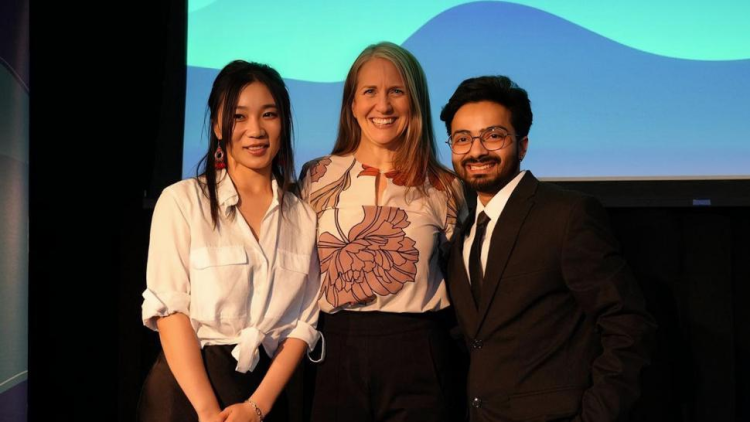A pair of Humber Polytechnic students have returned home from the Map the System competition, hosted by the Skoll Centre for Social Entprepreneurship at Oxford University, where they placed in the top six out of 50 post-secondary institutions and 1,750 participants worldwide.

Yangshu (Kelly) Jiang and Maharshi Trivedi, who are both recent graduates of the Global Business Management program, qualified for the Oxford competition after initially winning first place in Humber's Map the System competition for the presentation Mapping the Cyber Slavery Ecosystem in Myanmar and Beyond. That win sent them to Map the System Canada in Banff, where they finished in the top three and won a travel grant to support their participation at Oxford.
Cyber slavery, or digital slavery, is a form of transnational organized crime in which individuals often trafficked across borders are forced into online scam operations. These victims are beaten, starved, and tortured until they break.
Trivedi called it a tremendous experience travelling to London and visiting the prestigious Oxford University, with Jiang noting they held their own against teams from some of the top post-secondary institutions in the world including Oxford's entry.
"It's been an unreal journey and a wonderful experience for us with countless learning opportunities," said Trivedi. "I can't believe how far being involved in Map the System has taken us."
Map the System is a global competition run by Oxford University that tasks students with addressing environmental and social issues by first studying them to gain a deeper understanding of the root causes of a problem, its broader context and how it connects to other problems, which is a process known as systems thinking. The students attempt to make sense of its complexity by looking at the problem as a whole and focusing on the relationships between aspects of the problem - rather than by breaking it down into parts.
Systems thinking calls for a deep dive into complex issues. The idea is to understand what drives them before attempting to intervene so that the proposed solutions are successful and don't backfire and create more problems. The hope is to understand the nature of interconnectedness in order to understand the consequence of the actions. If not, the solutions may have unintended (and unwanted) consequences
More than 220,000 individuals are actively held in cyber slavery conditions with 120,000 within Myanmar.
Yu Jian is a young person from Jiang's hometown in China. In 2021, he accepted a good job offer abroad. By the following year, his family had lost contact with him, and in 2023, they received a call for his ransom. He eventually was returned home but was missing internal organs and died just days later.
Jian's story touched Jiang as it happened to someone around her age and from her own hometown. As part of their research, the team spoke with one survivor who was forced into cyber slavery for months.
"It's very difficult for these victims to escape or be rescued," said Jiang.
Together, they wanted to shed light on the issue and, hopefully, spare others from being human trafficked or falling victim to the scams themselves.
Their presentation examined how digital fraud, poor governance, and ethnic militia zones interact to form a trafficking ecosystem. Their research demonstrated how criminal networks penetrate national boundaries to bring in billions of dollars in illegal money annually.
Arrests aren't the answer, they argued. Structural change is needed for long-term remedies through victim-centred reintegration, regional law harmonization, and amplifying survivor stories.
"We're incredibly proud of our students and what they were able to achieve," said Chris Irwin, associate dean, Liberal Studies with the Faculty of Liberal Arts and Sciences. "When given this opportunity, they seized on it and did incredible things."
Irwin said Humber faculty members Elinor Bray-Collins, Sara Hassan, Isabel Sousa and Stephen Stockton play an invaluable role in Humber's Map the System competition and in providing mentorship and advice to the students who participate. He added that they've helped position Humber as a leader in systems thinking education in Canada and on the global stage.
The experience of taking part in Map the System has had many benefits for both Jiang and Trivedi. They embraced the many networking opportunities they had both here in Canada and abroad at Oxford while also learning how to work well as a team. Trivedi, who is admittedly a little shy, had to come out of his shell through public speaking while Jiang said participation helped improve her ability to learn while bringing her best for the presentation helped unlock her potential.













